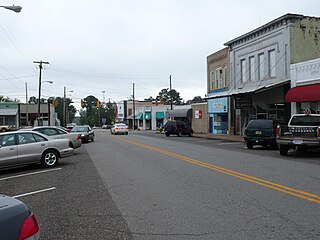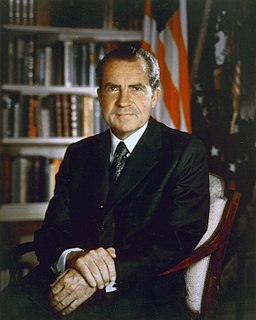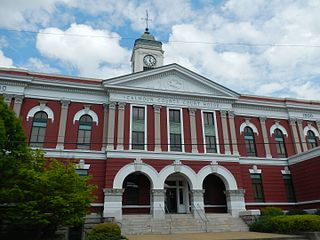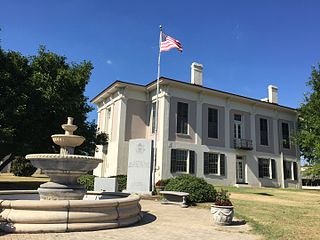
Eutaw is a city in and the county seat of Greene County, Alabama, United States. At the 2010 census the population was 2,934. The city was named in honor of the Battle of Eutaw Springs, the last engagement of the American Revolutionary War in the Carolinas.

George Corley Wallace Jr. was the 45th Governor of Alabama, a position he occupied for four terms, during which he promoted "low-grade industrial development, low taxes, and trade schools". He sought the United States presidency as a Democrat three times, and once as an American Independent Party candidate, unsuccessfully each time. He is best remembered for his staunch segregationist and populist views. Wallace was known as "the most dangerous racist in America" and notoriously opposed desegregation and supported the policies of "Jim Crow" during the Civil Rights Movement, declaring in his 1963 inaugural address that he stood for "segregation now, segregation tomorrow, segregation forever".
In United States history, the Redeemers were a political coalition in the Southern United States during the Reconstruction Era that followed the Civil War. Redeemers were the Southern wing of the Bourbon Democrats, the conservative, pro-business faction in the Democratic Party. They sought to regain their political power and enforce white supremacy. Their policy of Redemption was intended to oust the Radical Republicans, a coalition of freedmen, "carpetbaggers", and "scalawags". They generally were led by the rich former planters, businessmen, and professionals, and they dominated Southern politics in most areas from the 1870s to 1910.

The 1876 South Carolina gubernatorial election was held on November 7, 1876 to select the governor of the state of South Carolina. The election campaign was a referendum on the Radical Republican-led state government and their Reconstruction policies. Opponents disputed the challenger Wade Hampton III's victory, gained by a margin of little more than 1100 votes statewide. But he took office in April 1877, after President Hayes withdrew federal troops as a result of a national Democratic compromise, and the incumbent Daniel Henry Chamberlain left the state.

The 1878 South Carolina gubernatorial election was held on November 5, 1878 to select the governor of the state of South Carolina. Wade Hampton III was renominated by the Democrats and ran against no organized opposition in the general election to win reelection for a second two-year term.

The 1868 South Carolina gubernatorial election was held for three days from April 14 to April 16, 1868 to select the governor of the state of South Carolina. The election for statewide offices was held simultaneously with the vote on the South Carolina Constitution of 1868. Robert Kingston Scott won the election largely by the support of the newly franchised black voters and became the 74th governor of South Carolina.

The 1870 South Carolina gubernatorial election was held on October 10, 1870 to select the governor of the state of South Carolina. Governor Robert Kingston Scott easily won reelection based entirely on the strength of the black vote in the state. The election was significant because it proved to the white conservatives of the state that political harmony between the white and black races was impossible and only through a straightout Democratic attempt would they be able to regain control of state government.

The 1872 South Carolina gubernatorial election was held on October 16, 1872 to select the governor of the state of South Carolina. Franklin J. Moses, Jr. won the election as a Radical Republican against the more moderate faction of the Republican Party and became the 75th governor of South Carolina.
The Red Shirts or Redshirts of the Southern United States were white supremacist paramilitary groups that were active in the late 19th century in the last years of, and after the end of, the Reconstruction era of the United States. Red Shirt groups originated in Mississippi in 1875, when Democratic Party private terror units adopted red shirts to make themselves more visible and threatening to Southern Republicans, both whites and freedmen. Similar groups in the Carolinas also adopted red shirts.
The Election Riot of 1874, or Coup of 1874, took place on election day, November 3, 1874, near Eufaula, Alabama in Barbour County. Freedmen comprised a majority of the population and had been electing Republican candidates to office. Members of an Alabama chapter of the White League, a paramilitary group supporting the Democratic Party's drive to regain conservative political power in the county and state, attacked black Republicans at the polls.

The 1964 United States presidential election in Alabama was held on November 3, 1964. Alabama voters chose ten representatives, or electors to the Electoral College, who voted for President and Vice-President.

Elections in Alabama are authorized under the Alabama State Constitution, which establishes elections for the state level officers, cabinet, and legislature, and the election of county-level officers, including members of school boards.

The United States presidential election in Alabama, 1968 was held on November 5, 1968.
The Eutaw riot was an episode of white racial violence in Eutaw, Alabama, the county seat of Greene County, on October 25, 1870, during the Reconstruction Era in the United States. It was related to an extended period of campaign violence before the fall gubernatorial election, as white Democrats in the state used racial terrorism to suppress black Republican voting. White Klan members attacked a Republican rally of 2,000 black citizens in the courthouse square, killing as many as four and wounding 54.
Alexander Boyd is notable as the Republican County Solicitor and Register in Chancery of Greene County, Alabama in 1870 during Reconstruction who was murdered by a lynching party of Ku Klux Klan members. He was fatally shot on March 31, 1870 in Eutaw, the county seat. The Klan members apparently intended to hang him in the square in a public lynching, to demonstrate their power during this period and their threat to Republicans.

The United States presidential election in Mississippi, 1968 was held on November 5, 1968. Mississippi voters chose seven electors, or representatives to the Electoral College, who voted for President and Vice-President.

The 1968 United States presidential election in Florida was held on November 5, 1968. Florida voters chose fourteen electors, or representatives to the Electoral College, who voted for president and vice president.

The 1892 United States presidential election in Arkansas took place on November 8, 1892. All contemporary 44 states were part of the 1892 United States presidential election. Arkansas voters chose eight electors to the Electoral College, which selected the president and vice president.















